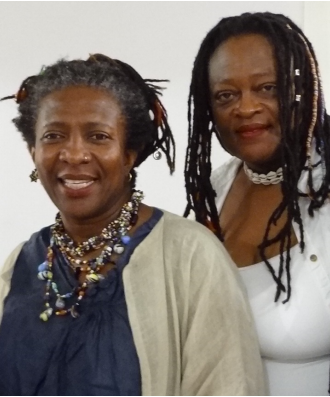Frieda featured in Forum on Contemporary Theory Newsletter
Informal Session with Frieda Ekotto
“New Directions in the Study of the Global South”
February 13, 2016
This interactive session discussed the significance of alternative narratives of the Global South, a novel perspective of realizing the other as affecting and shaping the self and vice versa. The importance of ‘Glocal’, the need to accommodate diverse alternative meanings of cultures and histories, the need to look at centrality of our concerns along with a peripheral vision, the need to broaden mental territories beyond the geographical, the rising local activism (women empowerment, education) carried out in Cameroon and its parallels in India, were some of the myriad topics explored.
The necessity of looking at a subject ‘subjectively’, the importance of understanding diverse local realities using different techniques or methods to studying local cultures that have been undermined by the mainstream and similar imposing discourses, were the key concerns addressed. The discussions ranged from drawing parallels between the kinds of oppression in Indian subcontinent and Cameroon; recognizing the pertinent social issues affecting society, especially those affecting the lower echelons of the social order; and proposing ways and means to chart out innovative alternatives towards perceiving it. Glaring social depressions in society like lack of hygiene, absence of sanitary facilities, atrocities to women, gender-based biased practices, environmental concerns were part of the discussion. Frieda Ekotto gave her generous and valuable insights on the world of academia and the need to focus more on multiple intellectual engagements in understanding a ‘subject’ from various vantage points, i.e. addressing both the centrality as well as the periphery. This intended to look beyond the existing lenses of nativism and westernization and explore possibilities between the two or beyond them. In her words, “The necessity to practicing a conscious exercise of being centered and yet, widening ones mental territories, by reaffirming the notion of ‘a world elsewhere’” formed the crux of the interactive session.
Marthe Djilo Kamga
The occasional lecture and informal session was documented by Marthe Djilo Kamga from Cameroon. Currently the founder and director of the Massimadi festival, Marthe Djilo Kamga’s professional and personal paths have revolved around her interest in questions of vulnerability, identity, and equal opportunity. Through these trajectories, she has developed expertise with questions that relate to very different populations: migrants living with HIV/AIDS, the homeless, children of first-generation immigrants, and individuals who identify as LGBTQI who come from Africa or its diasporas. She acquired her knowledge and experience in socio-medical and socio-cultural sectors. Her attention to these thematics has not been limited to bringing projects into fruition, but has also included defining and implementing coherent public policies that are relevant to local realities and in dialogue with their stakeholders. Her interest in art and cultural production (film, performance, photography, etc.) support her reappropriation of images and public spaces for people in positions of invisibility.




